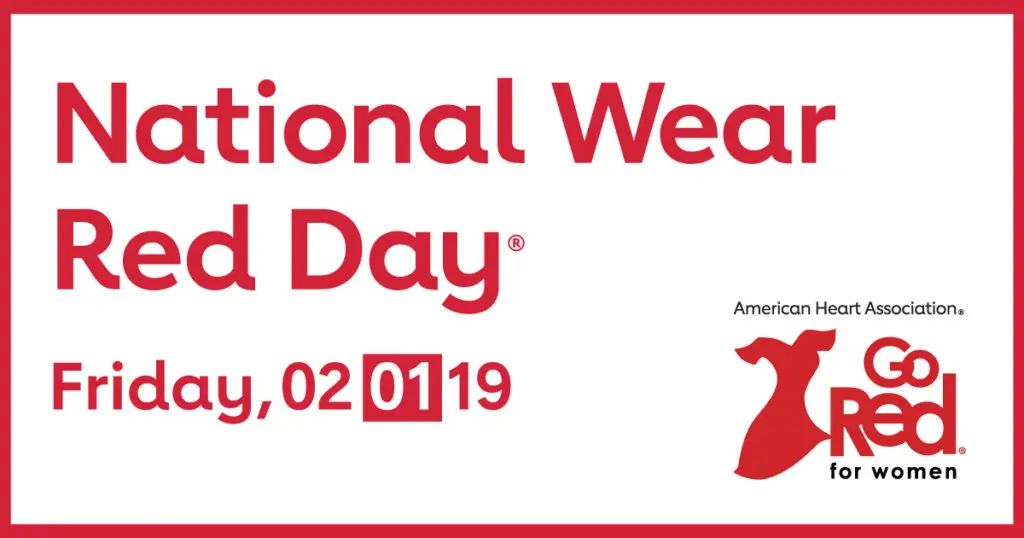One in three. That’s the price women pay for cardiovascular disease. While nearly 80 percent of cardiac events can be prevented, cardiovascular diseases continue to be a woman’s greatest health threat, claiming the lives of 1 in 3 women. That’s a third of mothers, sisters and friends.
On National Wear Red Day on Friday, February 1st — nationally sponsored by CVS Health — women everywhere will come together to take action to end heart disease and stroke in women. Hundreds of local businesses, community groups, hospitals, towns and schools will “Go Red” to help raise awareness and funds to fight heart disease, the number one killer of men and women.
On Wear Red Day, employees wear red and donate $5 to the Go Red For Women® movement and receive a red dress pin or magnet. Some companies have educational programs or heart health events or allow employees to “dress down” if they were red and donate. Funds raised through Wear Red Day help support the life-saving initiatives of the American Heart Association – awareness campaigns, prevention and education programs and cutting-edge scientific research.
Locally, Walden Savings, St Luke’s Cornwall Hospital, Mediacom and the FDR Mid-Hudson Bridge will all “glow red” for Wear Red Day to help shine a light on heart disease.
For more than 10 years, Go Red For Women has been dedicated women’s heart health because heart disease is the number one killer of women, claiming more lives each year than all forms of cancer combined. Prior to Go Red for Women, only 30 percent of women knew that heart disease was their greatest health threat. A decade after Go Red for Women launched, close to 56 percent of women recognized this fact, nearly a 90 percent increase in awareness.
Go Red For Women encourages women to be aware of their number one killer and know their numbers like total cholesterol, HDL (good) cholesterol, blood pressure, blood sugar and body mass index. Talk to your doctor to lower your heart health risk, especially if you have a family history of heart disease or stroke.
The AHA invites the community to move more by making physical activity a priority, and join the #GoRedGetFit team on Facebook. The AHA recommends 30 minutes daily of walking or aerobic exercise to help prevent heart disease and stroke. Take a walk at lunch or after dinner, workout with an online video or walk your dog—it all counts and helps to prevent heart disease.
Eat smart by making healthy eating a priority. Make the healthy choice the default choice at mealtimes. The AHA recommends a diet of mostly fruits, vegetables, whole grains and lean proteins and fish like salmon. Choose more low-fat, low-sodium foods and reduce dietary sugar, especially in beverages like bottled drinks and special coffee drinks.
If you have high blood pressure, commit to monitoring it regularly through the AHA’s Check. Change. Control. Tracker online. The AHA’s guidelines now say that high blood pressure is 130/80 or above. Talk to your doctor about a plan to manage high blood pressure before it causes damage to your arteries, heart, brain or other organs. Diabetes can increase your risk for heart disease. Learn more at https://knowdiabetesbyheart.org.
Learn more about preventing women’s number one killer at www.GoRedForWomen.org. Email JoAnn.Parker@heart.org at the American Heart Association, or by phone 845.542.4580, to learn more about local events like CycleNation, on February 28 at Sportsplex in New Windsor, http://www2.heart.org/cntricounty, or the TriCounty Heart Walk, May 5th at Harriman State Park. www.tricountyheartwalk.org.
# # #
About the American Heart Association
The American Heart Association is devoted to saving people from heart disease and stroke – the two leading causes of death in the world. We team with millions of volunteers to fund innovative research, fight for stronger public health policies, and provide lifesaving tools and information to prevent and treat these diseases. The Dallas-based association is the nation’s oldest and largest voluntary organization dedicated to fighting heart disease and stroke. To learn more or to get involved, call 1-800-AHA-USA1, visit heart.org or call any of our offices around the country. Follow us on Facebook and Twitter.


